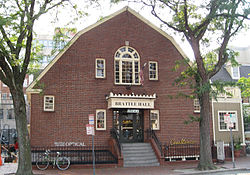Brattle Theatre

Brattle Hall. The theatre entrance is at the bottom of the stairs on the left
|
|
| Address | 40 Brattle Street Cambridge, MA 02138 USA |
|---|---|
| Type | Movie theater |
The Brattle Theatre is a repertory movie theater located at 40 Brattle Street (Brattle Hall) in Harvard Square in Cambridge, Massachusetts in the United States of America. The theatre is a small movie house with one screen. It is one of the few remaining movie theaters, if not the only one, that use a rear-projection system; the projector is located behind the screen rather than behind the audience.
The Brattle Theatre mainly screens a mixture of foreign, independent, and classic films, and began showing repertory and foreign films in February 1953. Despite the rapid disappearance of American arthouse theaters, the Brattle has managed to maintain a loyal base of moviegoers while remaining independently operated.
The theatre was started by the Cambridge Social Union, cofounded in January 1871 by the Reverend Samuel Longfellow, brother of Henry Wadsworth Longfellow. In 1889, the union purchased the lot on Brattle Street for $9,000, and hired the Cambridge architectural firm headed by Alexander Wadsworth Longfellow, Jr. to draft plans for Brattle Hall. The gala opening occurred on January 27, 1890. Local and touring drama groups used the hall, which also housed a ballet school, lectures, and police calisthenics. The theatre sometimes came into conflict with the city, however. In 1928, the city attempted to ban a production of "Fiesta", a politically controversial drama performed by the Harvard Dramatic Club, but could not close the show. The 1942 production of Othello starring African-American actor Paul Robeson played the Brattle, bolstering its reputation as a progressive institution.
In 1948, a group of World War II veterans attending Harvard founded the Brattle Theatre Company. The Company presented classic and contemporary serious drama with a group of repertory actors and directors. Among the players whose careers began with the Company were Jerome Kilty, Cavada Humphrey,Albert Marre, and Robert Fletcher. The actor Zero Mostel, who had been blacklisted for his political affiliations, made his national stage debut in a production of Molière's The Imaginary Invalid, and the British actress Hermione Gingold made her American debut.
...
Wikipedia
